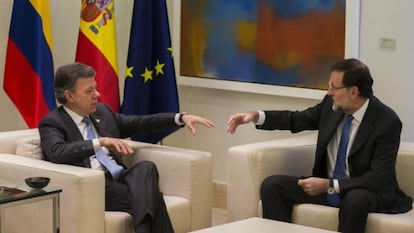Santos: “We have come further in the peace process than ever before”
The Colombian president begins his European tour to build support for FARC negotiations

On Monday, Colombian President Juan Manuel Santos chose Madrid as the first stop on his European tour to build political and financial support for the ongoing peace process taking place in Havana with the Revolutionary Armed Forces of Colombia (FARC). “The process is moving forward and we have come further than ever before,” Santos said during a ceremony where he received an honorary degree. “Making peace is the most urgent task of a leader,” said the head of state, who was elected in June in an electoral campaign where the peace process he advocated was one of the main topics. Now he is looking for the European Union’s commitment to create a fund to finance post-conflict initiatives after five decades of war, which led to nearly six million displaced people and more than 220,000 deaths.
Spanish President Mariano Rajoy sponsored Santos’s selection for this honor, with all its attendant university ceremonies, complete with mortarboard and hymns at the Universidad Camilo José Cela, which was founded in 2000. Rajoy underscored Spain’s support for Colombia and for Santos, and his confidence that the conflict is coming to an end: “We hope the FARC and ELN [National Liberation Army] will know how to take advantage of this historic opportunity that Juan Manuel Santos is giving them. If they disappoint the Colombian people again, they will end up being mere dust in the gutter of history,” he said in the presence of former Spanish prime ministers José María Aznar and José Luis Rodríguez Zapatero, among other dignitaries who attended the event.
Santos thanked Spain for its cooperation and friendship, calling it “the mother country.” “Who, if not Spain, could lead the European Union’s proposal to eliminate visas for Colombians?” Santos said, before turning to the thorny issue of the Catalan Independence drive. “We support the constitutional and territorial integrity of Spain,” he said.
Spain has offered to host the donors’ conference to create a fiduciary fund that, through the EU and with the participation of other nations, will finance substitution of coca production with other crops, development projects in the areas most affected by a war that has lasted 50 years, and the return of the displaced. Colombian Senator Roy Barreras, who presides over the congressional peace commission, has estimated post-conflict reconstruction costs to be about 90 billion pesos ($45 billion) and Santos wants to begin the initiatives as soon as the peace treaty is signed to avoid frustration and power vacuums. Germany’s credit bank for reconstruction and development said it will lend $100 million to Colombia to support the peace process.
The Colombian head of state detailed the benefits that would come with the end of the conflict. “If we reach a final agreement, Colombia’s potential will explode,” he said, as he explained that his country has the fastest-growing economy in Latin America, despite the conflict. “In four years, 3.6 million people have gotten out of poverty and 2.8 million jobs have been created.” Santos emphasized the impact of replacing illegal crops in a country that is one of the largest producers of cocaine and halting deforestation. “Peace would mean the end of the last armed conflict in the Western Hemisphere,” he added.
Meanwhile, the Spanish government has promised to maintain bilateral efforts with Colombia and to contribute “human resources” to an eventual peace operation based on the removal of landmines and disarmament. After Santos’s visit to La Moncloa prime ministerial palace, Rajoy accompanied his Colombian counterpart to lunch with the Spanish king. Later in the day, they attended a ceremony where Santos received an honorary doctorate. The Colombian president will take his message to Brussels, Paris, London, Berlin and Lisbon later this week.
Almost two years after negotiations began between the Colombian government and the FARC, the parties have agreed on three of the five points on the agenda: agrarian reform, political participation of FARC members and the destruction of drug-trafficking apparatus. The most complicated issues, however, are still on the table: justice for the victims and an end to the conflict, which includes disarmament, demobilization, and integration in civilian life.
These two issues are still the ones that worry Colombians the most. A survey published by Cifras y Conceptos last week suggests the majority of Colombians do not believe the process will end well. Only 39 percent said there will be a peace treaty and 85 percent of participants said they would disapprove if rebel leaders did not go to prison. This resistance to certain aspects of the peace process has been the root of criticism launched by Uribe allies in opposition. But Santos has tied his administration to this initiative, which proved to be a divisive issue for Colombians during the electoral campaign in June.
Translation: Dyane Jean François
Tu suscripción se está usando en otro dispositivo
¿Quieres añadir otro usuario a tu suscripción?
Si continúas leyendo en este dispositivo, no se podrá leer en el otro.
FlechaTu suscripción se está usando en otro dispositivo y solo puedes acceder a EL PAÍS desde un dispositivo a la vez.
Si quieres compartir tu cuenta, cambia tu suscripción a la modalidad Premium, así podrás añadir otro usuario. Cada uno accederá con su propia cuenta de email, lo que os permitirá personalizar vuestra experiencia en EL PAÍS.
¿Tienes una suscripción de empresa? Accede aquí para contratar más cuentas.
En el caso de no saber quién está usando tu cuenta, te recomendamos cambiar tu contraseña aquí.
Si decides continuar compartiendo tu cuenta, este mensaje se mostrará en tu dispositivo y en el de la otra persona que está usando tu cuenta de forma indefinida, afectando a tu experiencia de lectura. Puedes consultar aquí los términos y condiciones de la suscripción digital.








































